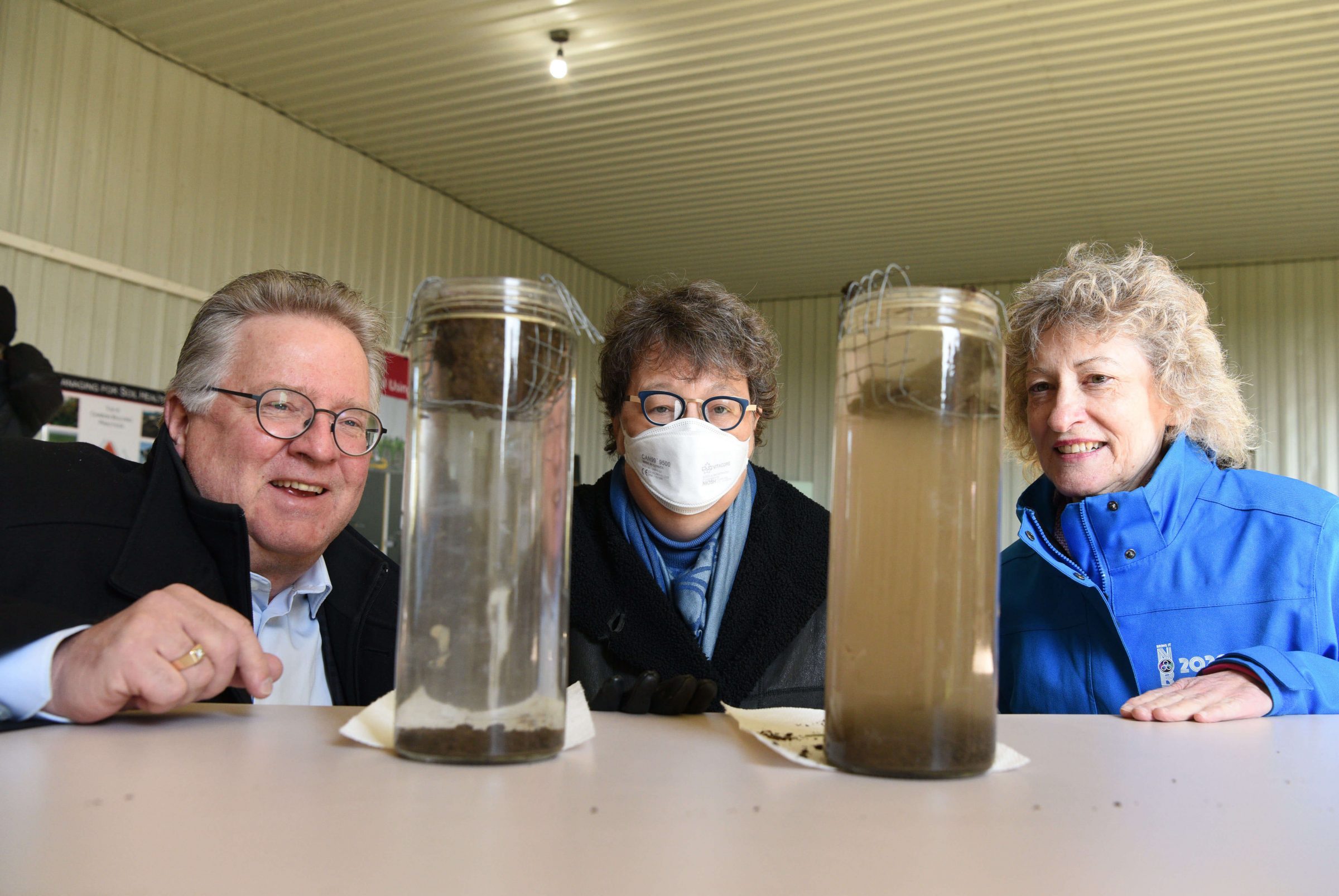WELLINGTON COUNTY – Senator Rob Black told fellow senators in the Senate Chamber a couple weeks ago, during National Soil Conservation Week, that Canada’s soil is a finite resource needing attention and protection.
Groups such as the United Nations and World Wildlife Fund say as much as half of the world’s topsoils have been lost to erosion.
Closer to home, there’s mounting evidence and research throughout the past 40 years from government bodies and academic institutions suggesting erosion is taking a toll on Ontario soils and organic matter levels in soils are in decline in the province.
“We as Canadians must continue to care about [soil] to ensure that we can grow the food that we do,” Black said in Ottawa on April 19.
From Parliament Hill to Wellington County, Black and two fellow senators, Paula Simons of Alberta and Pat Duncan of Yukon, toured the county and Guelph from April 24 to 26 to investigate exactly what’s happening here, on the ground.
“I think it was an eye-opener for all of us,” Black told the Advertiser by phone last week.
Black chairs the Senate’s Committee on Agriculture and Forestry, which is currently working through a study on Canada’s soil health, updating the last comprehensive study, Soil at Risk: Canada’s Eroding Future, completed in 1984.
Fact-finding missions, such as the one through the county, help senators to gather information from the field, Black said.
Committee members, including Black, also visited Glasgow for the World Congress of Soil Science in 2022, and are planning a trip to Rome, where the Food and Agriculture Organization of the United Nations is headquartered, to discuss the Canadian study and examine what’s happening globally.
“We need to look both across Canada and around the world at what’s happening around soil health,” the senator said of the need to embark on over-seas trips.
“It’s important not to reinvent any wheels.”
Last week the lawmakers:
- stopped at 3Gen Organics in Mapleton to learn about regenerative agriculture practices;
- witnessed what a rich microbial soil does to “tighty-whities” at the Elora Research Station;
- stopped at farm input and grain elevator company Woodrill to check out soil profiles and equipment;
- learned about seed treatments at Syngenta; and
- ended the trip over a dinner in Guelph with a roundtable of soil health advocates.
“It was good to see innovation in action,” Black said of the trip.
Concerns heard elsewhere of a need for more data sharing as well as funding were repeated on this trip, but Black said senators also heard about the need to do more to enhance soil quality.
“I expect that will be a piece of our report at some point in the future,” Black said.
Information gleaned from the taxpayer-funded fact-finding missions and testimony from witnesses will eventually culminate in a report with recommendations for the federal government.
From the ‘84 study, 13 conclusions were made and 20 recommendations proposed.
Not all recommendations were followed, but from the study came the Soil Conservation Council of Canada, which advocates for soil conservation across the country.
Black told the Advertiser in 2021, when he was pushing for the current study to happen, that public support is critical to funding better farming practices.
“If we don’t engage the public, Canadians in general, I don’t think that the government will give [the study] the consideration it really deserves,” he said at the time.
Black told the Advertiser last week that nobody at the federal level here is handling a file on the country’s soil — something Australia began doing as early as 2012 with the appointment of a National Soils Advocate.
“So, hopefully this study might enrich that discussion,” Black said.
The Senate committee has so far heard from 74 witnesses since the study began in September, according to Black, and there are more still to come.
“The potential for soil degradation remains a constant threat to resiliency and sustainability of agricultural and natural ecosystems,” University of Guelph professor Laura Van Eerd told the committee in Ottawa last year.
And there are implied economic risks from soil degradation as well, Mary Robinson, then-president of the Canadian Federation of Agriculture, told the committee this past February.
“As the heart of the Canadian agri-food system, generating $134.9 billion of Canada’s GDP, agriculture occupies a large and important part of our economy,” Robinson said.
Black doesn’t see an end to the study in sight, but said he expects the committee will have heard from all witnesses by the end of the year.
The senator hopes all levels of government, right down to local municipalities, will pay attention to the study and its recommendations.
“In Wellington County … we’ve got a shared responsibility for the soil that we have in our communities,” he said.
Committee members are now looking westward to Alberta and Saskatchewan for their next fact-finding missions.
On April 27, as Black attended the Canadian Produce Marketing Association convention in Toronto, committee members in Ottawa voted to seek budget approvals for the trips from the Committee on Internal Economy, Budgets and Administration, and eventually in the Red Chamber.
For the recent county trip, according to a committee report, members sought a $62,080 budget, however Black said “considerably less” was approved and spent.
The true cost of the trip wasn’t immediately available, but an official familiar with trip logistics said about half of the requested cost was approved.




